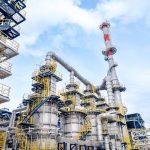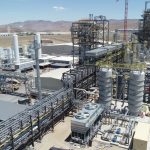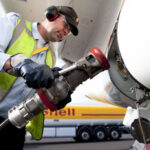Two sustainable aviation fuel (SAF) projects in the UK have been announced that involve British Airways, one to investigate a commercial facility that would produce more than 100 million litres per year of jet fuel made from atmospheric CO2 and the other to recycle carbon from UK wood waste and turn it into SAF. Partners on the projects include US company LanzaTech and its offshoot LanzaJet. Project AtmosFUEL is a collaboration of Canadian direct air capture (DAC) technology company Carbon Engineering, LanzaTech UK, British Airways and Virgin Atlantic, and is targeting a proposed facility to be operational by the end of the decade. Also with a goal of producing 100 million litres of SAF a year, Project Speedbird brings together Nova Pangaea Technologies, LanzaJet and British Airways. Both projects were recently shortlisted by the UK government to receive funding from the ‘Green Fuels, Green Skies’ competition.
Project AtmosFUEL will examine how Carbon Engineering (CE) and LanzaTech technologies can be integrated to recycle atmospheric CO2 into ultra-low carbon jet fuel. CE’s DAC technology will capture CO2 from the atmosphere so it can be fed into LanzaTech’s gas fermentation process to produce low-carbon ethanol. The ethanol will then be converted into SAF using LanzaJet’s alcohol-to-jet (AtJ) technology that was developed by LanzaTech and Pacific Northwest National Laboratory in the United States. The fuel, which is claimed to offer more than a 90% reduction in GHG emissions compared to conventional fossil jet fuel, will undergo certification by the Roundtable on Sustainable Biomaterials.
“Using DAC to make SAF presents an opportunity for unprecedented scale, a key factor when the greatest challenge we face as an industry is getting the volumes of fuel we need into planes as soon as possible,” said LanzaTech CEO Jennifer Holmgren. “We applaud the UK government’s continued leadership role in creating opportunities for bringing recycled carbon into the supply chain to enable achieving Net Zero.”
LanzaTech says its first commercial gas fermentation plant has produced over 20 million gallons of ethanol and has been working with the UK government and several industrial partners on Project DRAGON to build the world’s first commercial-scale, waste ethanol-based AtJ production facility in South Wales (see article). The fuel will be used by UK-based airlines, including British Airways and long-time partner Virgin Atlantic. The feedstock for the facility will be procured from a variety of waste sources and the facility will have the ability to also use ethanol produced from local steel mill waste gases.
From a pilot plant in British Columbia, CE has been capturing atmospheric CO2 since 2015 and converting it into fuels since 2017. In partnership with 1PointFive, which has financial backing from United Airlines (see article), CE is engineering a large-scale, commercial DAC facility in the US that will capture one million tonnes of CO2 per year.
With UK partner Storegga, CE has begun engineering and design of a proposed facility in north-east Scotland to permanently remove between 500,000 and one million tonnes of CO2 per year. It would be the first large-scale facility of its kind in Europe and the partners are aiming for it to be operational by 2026.
“These types of first-of-a-kind facilities will position the UK as a world leader in advanced low carbon jet fuel breakthroughs and will deliver significant emission reductions and rippling economic benefits,” said CE’s VP Europe, Amy Ruddock.
Virgin Atlantic’s Chief Commercial Officer, Juha Jarvinen, commented: “The involvement of two leading UK airlines as partners in this project reflects how important it is to support such innovation and the role airlines play in developing a UK-based SAF production capability. We very much look forward to working with our partners over the coming months.”
Added British Airways CEO Sean Doyle: “We look forward to pushing forward with this project, which is one of many we’re working on as we head towards our target to decarbonise and reach net zero carbon emissions by 2050.”
The airline is involved in four of the eight projects that have been shortlisted to receive grant funding under the Department for Transport’s ‘Green Fuels, Green Skies’ competition (see article).
“These plants would be a game-changer for our industry, not only delivering sustainable aviation fuel but also creating many hundreds of highly skilled jobs while increasing economic growth around the UK,” said Doyle.
Shortlisted Project Speedbird, involving LanzaJet, British Airways and Nova Pangaea Technologies, which is based in Redcar, northeast England, aims to develop the UK’s first SAF production facility to utilise UK-sourced wood waste. According to the Wood Recyclers Association, the amount of waste wood processed in the UK increased by 6% to 3.98 million tonnes in 2019.
The integrated technology platform is based on Nova Pangaea’s REFNOVA patented process of converting lignocellulosic feedstocks, such as waste wood and non-food biomass, into sustainable biofuels and chemicals. LanzaJet’s technology would then convert the ethanol to synthetic paraffinic kerosene and synthetic paraffinic diesel to produce SAF and renewable diesel.
“We plan to deliver the first UK-based end-to-end sustainable value chain from UK wood waste and residues to SAF,” said Sarah Ellerby of Nova Pangaea, who was appointed CEO in January 2020 following 15 years of experience as CEO of three US companies within the energy sector.
Jimmy Samartzis, CEO of project partner LanzaJet, said: “The conversion of wood waste to SAF in the UK helps decarbonise aviation and recycles carbon from local UK wood waste. At LanzaJet, we’re in a unique position with ready and scaling technology to produce lower carbon, sustainable fuels. Our partnership with British Airways and Nova Pangaea provides a novel and important integrated solution for the UK.”
Photo: Heathrow Airport













More News & Features
SAF One announces new investment and technology partners for Middle East SAF project
New initiative formed to accelerate SAF adoption and production in the Pacific Northwest
EcoCeres opens new Malaysia production facility as SAF ambition in Asia scales up
Aviation, shipping and fuel leaders convene in Rotterdam to accelerate sustainable fuels scale-up
EU SAF mandates will have to be revised, predicts French oil chief
Lessons learned from the collapse of Fulcrum BioEnergy